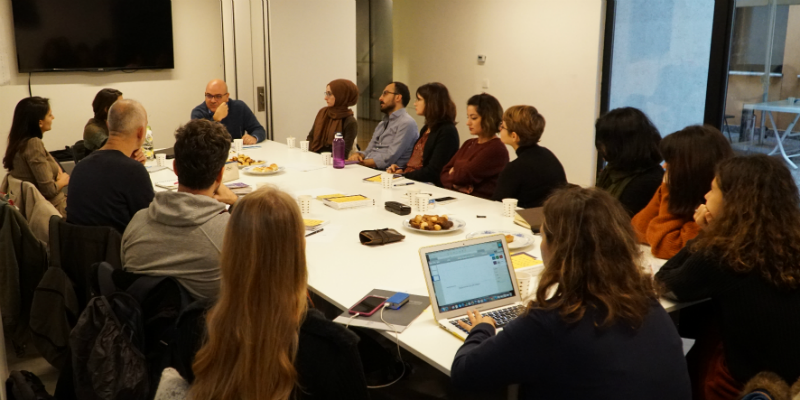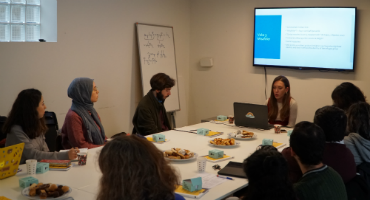Organized by ASULIS Discourse, Dialog and Democracy Laboratory of Hrant Dink Foundation, three researches focusing on the relation between migration and discourse were discussed in the second session of the series Asulis Social Sciences Grad Students Workshops. The workshop was held in Hrant Dink Foundation Anarad Hığutyun Building on November 16.
ASULIS aims to encourage pluralism, the ideal of coexistence and future researchers who will carry out new studies in this field. Organized with this purpose, the workshops aims to enable the discussion of master theses, facilitating dialog between researchers studying this topic and making academics and researchers come together.
Firstly, Nurbanu Dursun’s master thesis, which she submitted to Boğaziçi University Department of Sociology in 2017, with the title “The Syrian “Other” in Everyday Life: Perspectives on Syrian Refugees in Üsküdar” was discussed. Nurbanu talked about mobilization of conservative people in daily life of Üsküdar concerning the refugee issue on the basis of the in-depth interviews that she conducted in Üsküdar and techniques of participant observation. Discussing her findings under the titles “neoliberalism” and “neo-Ottomanism”, Dursun argued that conservative subjects resorts to a neo-Ottoman discourse with the neoliberalization of migration and refugees. Prof. Dr. Pınar Uyan Semerci, deputy dean at Istanbul Bilgi University Department of Social Sciences and Humanities, assessed Dursun’s thesis. Semerci emphasized the scope of the selected sample, reminded that the findings are informed by quotations from a certain group and pointed out the importance of diversity of quotations. Arguing that it is impossible to evaluate migration in Turkey only on the basis of neoliberalism, Semerci stated that the presence of the state should also be studied.
Secondly, Aysel Öztürk’s master thesis, which she submitted to Istanbul Şehir University Department of Cultural Studies in 2017, with the title “The Production of Refugee Subjectivities in The State Discourse: The Case of Syrian Refugees in Turkey” was discussed. Öztürk reviewed the findings of her discourse analysis on how the subjectivities of refugees are produced in the state discourse. Discussing the ways the state produces refugee subjectivities around different contexts and constructions under the titles “religious discourse”, “historical discourse” and “pragmatic discourse”, Öztürk claimed that the subjectivities of refugees are produced around uncertainty as a result of these fields of discourse. Assoc. Prof. Emre Erdoğan, deputy department head at İstanbul Bilgi University Department of International Relations, assessed Aysel Öztürk’s thesis. Erdoğan pointed out that flexibility in qualitative studies gives more authority to the researcher than necessary and a well-organized flow and coding model is needed to break this authority. Noting that the objects of the discourse should be considered in discourse analysis, Erdoğan stated that the selected sample should be well-defined.
Lastly, Dilşad Turan’s master thesis, which she submitted to Istanbul Bilgi University Department of Social Projects And Management Of Non-Governmental Organizations in 2018, with the title “Contact Bridge Across The Border: Syrian Women Refugees Discourse Analysis on Social Relationships” was discussed. Turan reviewed the in-depth interviews that she carried out with 19 Syrian women living in Istanbul by using the critical discourse analysis method. Aiming to understand what Syrians think about people of Turkey and how they build their own position on the basis of the accounts of Syrian refuges, Turan noted that she based her analysis of how social structures are rebuilt on “social contact theory” and “integrated threat theory”. Assoc. Prof. Nur Banu Kavaklı Birdal, department head at Altınbaş University Department of Sociology, assessed Turan’s thesis. Noting that creating a homogenous group of other by erasing the differences in migration studies is unfavorable, Birdal emphasized the importance of voicing the other side by reversing this relationship. Stating that migration is a gendered processes and experience, Birdal asked how women are empowered: Is it just because the experience of migration, or was the erosion of male authority a factor? Birdal noted that this question is inevitable for evaluating migration from gender perspective.





